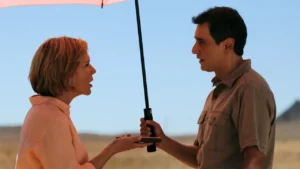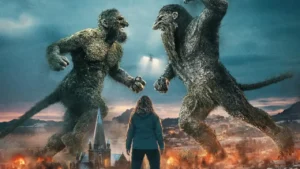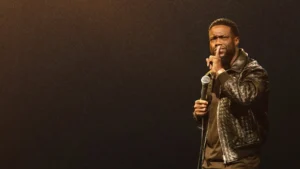Summary
A presentation of rural animal life and how they must feel amongst humans via a striking role reversal. Baptiste Rouveure has an original and memorable way of bringing the viewer into the world of his protagonists.
Anonymous Animals is possibly the most serious film I’ve seen this year; yes, even more so than The Swerve. It’s a fable, a nature film and because of its unusual slant, a clever and unsettling horror film.
Originally called Les Animaux Anonymes, the film presents the lives of animals in rural France: capture, taming, feeding, fighting, dying. Much of it is filmed low down, amongst the undergrowth, as if from their perspective; and we are given their perspective from the visual narrative, too, as the camera concentrates largely on the animals’ emotions and reactions throughout the film.
I can’t tell you which types of animals feature, though, as they are all played by people, looking indeed like people; and their hunters, farmers, etc. are all played by people presenting as animals. A gamekeeper with the head of a rather regal-looking deer, for example, is a striking and intimidating sight. And this is the horror of Anonymous Animals: the film continually raises the question of what life is like for animals under human rule; and it dares to show us the answer too.
Written and directed by Baptiste Rouveure, I have to confess Anonymous Animals crept up on me as I watched, and steadily impressed me more and more, as I got to understand Rouveure’s approach to the subject. Initially, the film appears to be simply a series of unconnected vignettes, an everyday tale of country folk (and fauna). A number of the “animals” reappeared several times, so one could piece together their story, but there is no true narrative as such. Rather, as I came to realize, the low intellect of many animals may simply give them an awareness of life being made up of things that happen, with minimal progression as such. Stories are a human invention, after all. Music supplemented Anonymous Animals to give what we saw a sense of drama and development which wouldn’t normally exist within simple forests or farms.
A key device employed here is the absence of any spoken dialogue. Many of the animal-headed farmers and other “two legs” converse in their own languages, which is clearly not understood (beyond the general sentiment) by their charges. Well of course: real animals wouldn’t be expected to understand our language any more than that. Between that, the crisp autumn cinematography (credited to Emmanuel Dauchy, Kevin Brunet, and Baptiste Rouveure himself) from their angle, and the “animals’” expressive faces, I was drawn into their world almost without my noticing. I want to credit the key cast names, though I can’t tell you what each played, as none of the “animal” roles were named: Thierry Marcos, Aurélien Chilarski, Emilien Lavaut.
Not just the principal cast, but every “four leg” face showed me what life is like living in a world without freedom. Anonymous Animals is truly an animal rights presentation; but on the other hand, there is nothing overtly political or pamphleteering about it. It simply presents a role-reversed world and lets the viewer’s thoughts crystallize at their own pace.
That said, it didn’t convert me to veganism any more than Okja did. I admired what happened here as an impressive and effective storytelling device, and it wouldn’t surprise me if other viewers are affected more. For the most part, though, I would imagine that the message of Anonymous Animals will reach only those who are already converted.
The UK premiere of Anonymous Animals is screened at Grimmfest on 7 October 2020.



